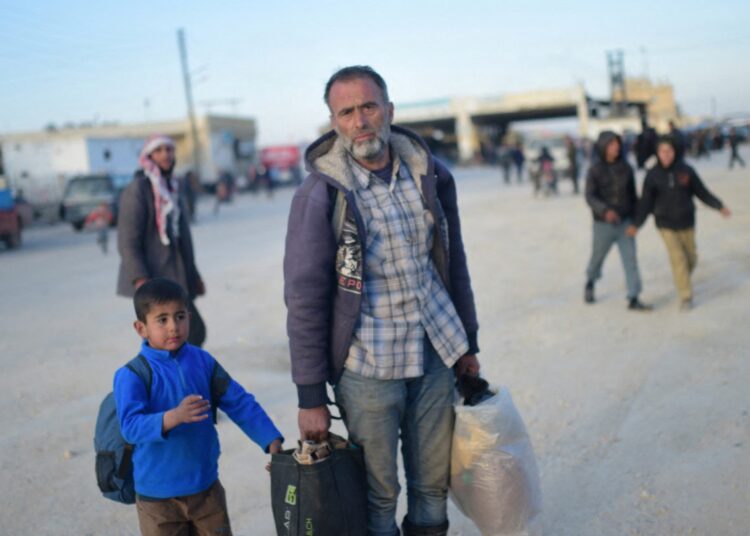Abdullah Bozkurt/Stockholm
In a lawsuit filed with the Council of State, Turkey’s highest administrative court, a far-right nationalist party has requested the revocation of Turkish citizenship for approximately half a million foreigners, primarily Syrians, who have been naturalized in Turkey.
According to the petition filed by the nationalist İyi (Good) Party with the 10th Chamber of the Council of State on October 1, a copy of which was obtained by Nordic Monitor, millions of Syrians and other foreigners living in Turkey under various statuses present a national security risk, undermine the social and cultural fabric of Turkish society and ultimately threaten the very existence of the Turkish nation.
The İyi Party is represented in the Turkish Parliament with 30 deputies and received 10 percent of the national vote in the 2023 elections. Its views on immigration are shared by several other political parties, including the Nationalist Movement Party (MHP), a far-right ally of Turkish President Recep Tayyip Erdogan.
The party’s lawyers presented several legal arguments to support their claims, including citing a nearly century-old law. They argued that granting citizenship to Syrians is explicitly against Law No. 1062, adopted in May 1927, just a few years after the establishment of modern Turkey following the dissolution of the Ottoman Empire.
The law was originally adopted by the Turkish Parliament on May 28, 1927, as part of reciprocal measures against French and British authorities in former Ottoman territories where the properties of Turks were seized. At the time Syria, which was under French rule, was of particular concern to Turkey due to disputes over territorial claims, especially regarding the province of Alexandretta (now Hatay), which later became part of Turkey.
The lawsuit claimed, “Due to historical issues between Turkey and Syria, there are legal restrictions that make it legally impossible for Syrian nationals to acquire property and obtain citizenship as a result.”
The text of a legal petition asking the court to revoke citizenship granted to foreigners in Turkey:
The dispute between Turkey and Syria over properties and territories remains unresolved, prompting the Turkish government to adopt a cabinet decision in 1966 that authorized the treasury to confiscate all assets and properties belonging to private and legal persons of Syrian nationality in Turkey. This decision was justified based on the 1927 law.
At the same time the cabinet decision banned Syrian nationals from acquiring new immovable properties. According to the lawsuit, both the law and the cabinet decision are still valid today; therefore, any Syrian national who acquired Turkish citizenship through a property investment scheme must have their citizenship revoked.
In 2017 President Erdogan’s government launched a campaign to encourage the sale of houses to foreigners in order to meet foreign exchange needs and stimulate the real estate market. A residence permit for one year was granted to foreigners who purchased a house in Turkey, regardless of the price. Turkish citizenship was promised to foreigners who bought real estate priced at $1 million. In 2019 this limit was reduced to $250,000 and increased to $500,000 in 2022.
Although the lawsuit specifically singles out Syrians due to this nearly century-old law, it further targets all foreigners who became Turkish citizens through property investment schemes. An estimated 500,000 foreigners have acquired Turkish citizenship in the last seven years based on figures for real estate purchases. In addition to Syrians data indicate that Russians, Iranians and Afghans also represent a substantial number of foreigners who have obtained Turkish citizenship in recent years.
The lawsuit claimed that changes in regulations introducing a property investment scheme as a pathway to Turkish citizenship violate not only the Turkish Constitution but also the laws governing the status of foreigners in Turkey.

There are essentially two paths to Turkish citizenship for foreigners in Turkey. The traditional path requires a foreigner to maintain five years of continuous residence, fulfill income criteria and prove language proficiency. Additionally, the foreigner must not pose a threat to national security or public order or health.
The exceptional path, approved by the Turkish president, allows foreigners with outstanding achievements in various fields such as sports, science and technology as well as immigrants or individuals whose naturalization is deemed necessary by the president to acquire Turkish citizenship.
The lawsuit challenges both paths for foreigners who either obtained Turkish citizenship through property investment or maintained long-term residence as refugees in Turkey. It argues that purchasing real estate worth half a million dollars cannot be considered a genuine investment that contributes to the Turkish economy. Furthermore, it contends that refugees, such as Syrians, Afghans and others, are provided only temporary status and do not have the right to apply for citizenship.
The lawsuit primarily concerns 238,768 Syrian nationals who were under temporary protection status before acquiring Turkish nationality. According to official figures of these, 134,624 are adults and 104,144 are children. The Erdogan government has drastically reduced the number of Syrians granted citizenship since last year, with only 183 Syrians being naturalized.
In total Turkey currently hosts 4,425,230 foreigners with legal residence rights. This figure includes 3,099,524 Syrians under temporary protection, 221,353 foreigners under international protection and 1,104,353 foreigners with residence permits.
There have been allegations that the government downplays the figures out of fear of public backlash, with reports suggesting that the actual number is well over 13 million, including 7 million Syrians.
The lawsuit states that regardless of which figures are considered, such a large number of foreigners in Turkey would lead to economic, social and cultural disruptions in the country, undermine public order and security, inflict irreversible damage on the demographic structure and ultimately pose a national security and existential threat.
The text of a legal petition by the Union of Bar Associations asks the court to revoke the citizenship pathway granted through property investment in Turkey:
A similar challenge to the government’s regulations on pathways to citizenship through investment in real estate was filed by the Union of Bar Associations (Türkiye Barolar Birliği, TBB) in June 2022. They requested that the Council of State revoke the presidential decree and relevant regulations allowing foreigners to acquire Turkish citizenship by purchasing properties. The case is still pending.
Given that the judiciary in Turkey is entirely dependent on the Erdogan government, the likelihood of the lawsuits succeeding at the Council of State is directly tied to the government’s stance, which appears to be increasingly restrictive regarding the granting of Turkish citizenship to foreigners.
Immigration has long been one of the leading political issues during election campaigns, and the Erdogan government is compelled to consider the growing anti-immigrant sentiment in Turkey while implementing restrictive policies.
There have been credible reports that many Syrians were forced to return to their home country, often under coercive circumstances, although the government claims that 625,000 Syrians had voluntarily returned as of February 2024. The government has set a goal of reaching 1 million voluntary returns by an unspecified date.
The Erdogan government has also been seeking to normalize its relations with Syria with the aim of repatriating millions of Syrians who have been living in Turkey under temporary status. However, so far, Ankara’s overtures have not been reciprocated by Damascus, which demands the withdrawal of Turkish troops from northern Syria as a precondition.
President Erdogan has repeatedly stated that he is ready to meet with Syrian President Bashar al-Assad, but there has been no positive response from the Syrian government regarding such a meeting so far.












